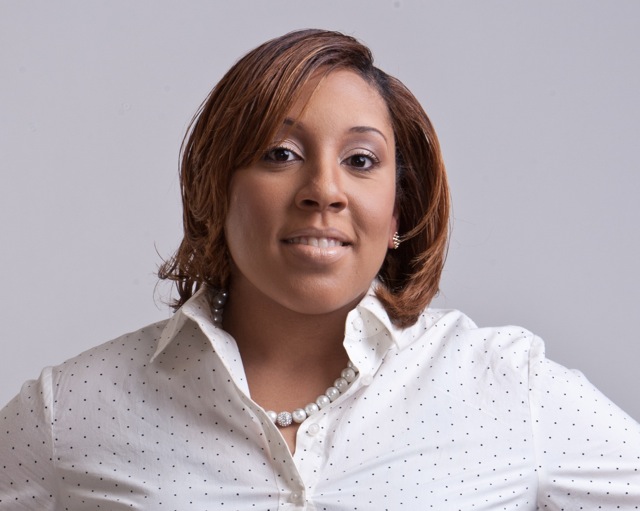
On this September edition of INTERVUE, when it comes to having a career, some of us will need a boost or a new start in time. In the upcoming book Career Rehab: Rebuild Your Personal Brand and Rethink the Way You Work, professional career and life coach Kanika Tolver helps readers strip away what’s holding them back to create the career of their dreams. Readers will learn how to: overcome fear to pursue their dreams and change careers as part of a strategic plan, develop a unique career brand and apply to companies and organization where they can develop a career brand. Let’s get the inside scoop from Ms. Tolver in reviving our careers.
So, as I mentioned moments ago, you’re a native Washingtonian, Bulldog graduate—Bowie State University—and this is your second book since Life Rehab, and I want to know what is your inspiration to writing Career Rehab?
So, Career Rehab is very inspirational behind me having several different bad career experiences. I like to call them “career heartbreaks.” (laughs)
So, I started career coaching a few years ago, and they started to ask me the hard questions; “how do I deal with a toxic work environment?” “How do I deal with a bad manager? How do I make myself marketable or find a job that makes me happy? I’m tired of finding jobs that lead me to a place of unhappiness.” So, Career Rehab is about rebuilding your personal brand so you can be marketable for the jobs that are going to make you happy; so you can get out of that “being stuck” feeling. And that’s why I wrote the book. It’s a lot of great success stories in the book of people that I’ve helped in my coaching practice, and I’m sharing my own advice.
Well, that’s pretty good. So, what is one foundational concept you can share with our readers and viewers about making positive, bold life career choices for the better?
One thing that I talk about in the book is “speed dating jobs.” It’s a concept I came up with. Instead of staying on a job for a long period of time that you hate or a job that’s not adding value to your career, speed date jobs. So, date jobs for twelve to twenty-four months and get training and certifications and get the things out of that job that can help you be able to get the next job.
So, I like to look at speed dating jobs as we’re in a relationship with a job because we spend 80% of our time there right? We’re at home only on Saturdays and Sundays. So, date that job; get what you can get out of it, and keep going to different positions until you find the job that you want to marry that you can see yourself having a long-term career span at. So, that’s one of my favorite bold moves is to not stay stuck in a job you hate.
I definitely agree with that, because I know from personal experiences there were some jobs that I hated, and I hated that job so much I wish I could get out of it, and hopefully find some way to get out of it. I know from personal experience, I’ve been jumping in and out of jobs for shorter than twelve months. What piece of advice would you give to someone who’s been stuck in a rut, had very short term jobs, but wants to get a long term job, but never able to get that first bite at getting a long term position? What advice would you give them?
That’s a good question because I’m in the technology field. So, in the information technology field, we move around because technology constantly changes. People that do freelance or people that do short-term contracts or short-term projects, my advice for them is to basically do a lot of research on the companies that are a good culture fit for them. I think we focus on money so much when we’re looking for a long-term position, we’re not really focusing on developing a list of standards of things we want from benefits to company culture to diversity inclusion to management style, because that’s going to dictate, based on your past experiences working short-term positions.
You’ve been exposed to a lot of different opportunities and organizations that have shown you good and bad situations that you liked or disliked. Take that short-term experience and develop a long-term goal list, and use Glassdoor.com to find a company that specifically fits into what you want out of a long-term opportunity.
Absolutely. I think Glassdoor.com will appreciate that plug right there. (laughs)
Glassdoor.com, I know you’re not paying me, but I am plugging you. (laughs)
(laughs) Absolutely. You’ve been a career coach for some time. Can you explain the method you teach for setting goals and how they relate to your core values?
People sometimes say that sometimes. I’m like, “I’m figuring my own life out, I can’t coach you on life; I can coach you on the career.” You specifically asked me what types of methods do I use that align with my core values?
Yes. In other words, explain the message you teach when setting those goals to get them to their career, the career that they want.
Awesome. I like to look at things in incremental goals because I think sometimes we just want to get out of our job that we don’t focus on setting a three, six month, nine-month goal framework. When you’re in a job you don’t like, you’re ready to move on to a job that you feel is going to be a better fit. The first thing I like my clients to do is to identify all of the knowledge gaps. So, what are the things that you don’t know about the job that you really want that you need to learn? So, that means training and development, acquiring certifications. If you want to go back to school for further education, maybe obtaining a degree.
I think those are core goals that help you brand yourself so that you’re marketable for the types of positions that you desire. Number two, I also ask them to set a goal that’s realistic for that, because sometimes people want to think that they can do a career change in a month, and that’s really unrealistic. I ask them to set a time frame of when they think they will acquire those skillsets, and I also ask them to set goals for transferrable skills. We, as professionals, always do not really think about what is transferrable. What have we already done that can go into the next role?
So, I ask them to make a list of things that they are really good at what they’ve done and their projects and to align them with where they’re trying to go and where they’ve already been. And number three would be, I ask them to update their resume with the new skillsets that they’ve acquired, and to also think about doing some free internships; maybe internships that are with other companies or organizations, with their church or non-profit, where they can get those professional skills.
Update your resume, repost it up on LinkedIn, Indeed, Glassdoor. Start making sure that you’re reaching out to the right recruiters that are at the companies that you desire to work for.
Excellent. So, does the average person come with a specific number of issues, do they come with a specific goal in mind, or they need help to get out of this one career and go into another career?
So, I started off writing resumes, maybe three to four years ago. I used to write resumes for people, and they couldn’t get a job. They wanted to stay in their existing industry. They didn’t want to do a career change, but their resumes weren’t getting the hits that they wanted to get online. So, I don’t write resumes anymore because I write books now, so I don’t really have the time to write resumes. But, the average person—a lot of my clients are in the DC/MD/VA areas. So, we’re talking about federal employees.
I would say a big percentage of my clients are federal employees, government contractors and people in the private sector in IT, but I actually coach all industries. So, I would say a majority of people want more money, and they want more promotion potential. I would say that’s maybe a 60-70% range. Maybe that 30% range are people that are saying, “I want to move into tech.” I get a lot of requests about, “hey, I think tech industry is booming. I think I should do a career change into tech.” So, I get a lot of requests on that as well.
Wonderful. I may have to come to you with my resume and career choices someday.
Definitely recommend it.
How did you get involved with career coaching in the first place? Is it something that’s easy to get into or was it through some challenges to get into it?
I stumbled on it. I didn’t even think I was going to become a career coach. As I said, I started writing resumes and people started getting jobs as Microsoft and Boeing, and they were getting federal government job promotions. And then, they started to come back and started to ask me questions that were outside of the resume. They started to ask me, “well, what should I do when I need to negotiate my salary,” or “what should I do if the location isn’t right?” or “what if I actually want to relocate to another state?” These questions just started evolving in my consultations with clients as I was gathering their resumes because they had to tell me what was going on with their resume and what was going on in their current position.
So, I kind of stumbled into career coaching. But I think the reason I’m passionate about career coaching is that I really am so happy to see people win. I’m happy when they go on an interview and they get a job offer, and I’m happy to see women of color win. I’m happy to see African-American men like—my clients have gotten into Microsoft, who only hire 2% African-Americans. I guess I’m so passionate about beating the odds, that’s what makes me so excited about career coaching.
What can fans of your first book look forward to in the second book? What can they look forward to?
They can expect a lot of career boldness, career courage, me talking to them in the book about how to network like a hustler; chapters like how to be a brand and not an employee; how to look at yourself as a brand and don’t have an employee mindset. They can look for things such as how to do fearless resignations; how to not be afraid to resign from a job that’s not healthy for them. There are some awesome chapters about work-life balance in there that I’m teaching people how to focus on managing their stress, anxiety, and depression.
A lot of people don’t want to talk about mental illness and a lot of times, jobs—they are part of the reason that people are mentally ill. I think that it is going to be something that other career coaches have been scared to talk about. I’m not talking about how to land a job; I’m talking about how to also have a career lifestyle that’s healthy for you.
I definitely agree. Now that you’ve mentioned all that, I definitely need to get your book.
(laughs)
Especially since with all things I’ve gone through in my job hunt over the years, I’ve gone through depression, lost a job, wanted to resign a job that I didn’t like, but I didn’t have the courage so this definitely is a great book for me. So, I want to know—definitely for people around the DMV and beyond—so what is one final piece of advice would you give for our readers and our viewers? What’s one piece of advice would you give?
One piece of advice I would give people is to look at Career Rehab as a mindset shift. I think it takes a lot of courage to say that—when people think I’m using the word “rehab,” I’m not using it in the sense of addiction.
I’m using it in the sense of “let’s rebuild, let’s renovate our careers.” One piece of advice I would tell people is that there’s nothing unrealistic. Whatever your career desires that you have, it takes for you to do the work, and that’s where the rebuilding of your personal brand comes from. I think sometimes we get so lost in our thoughts about the idea of being scared to leave a job, being scared to start a new career path, being scared to speak up at work when we know we’re being mistreated. I want people to understand that Career Rehab is a journey.
It’s really not like a destination; it’s really more so like—as we evolve as professionals, there are going to be career challenges that we’re going to have to learn to embrace, and we’ll have to learn to tackle it, but please just embrace having the courage to do so.
That would be my advice is to have courage, to take control over your life. It’s your life, it’s your career. It’s not the job’s responsibility to make you happy. It’s your responsibility to take that challenge or that obstacle and reverse it and make it work for you.
Now if people want to find more information about you, pre-order Career Rehab, or have you as a life coach, where can they find you?
They can find me on Twitter @KanikaTolver. All my social media is @KanikaTolver. So, whether you’re on Instagram, whether you’re on Twitter, whether you’re on LinkedIn, whether you’re on Facebook, I’m pretty much—my first and last name is pretty much searchable on Google. So, you can find me at kanikatolver.com. You can also reach out to me via Facebook if you want to reach out to me and send me a message. I’m always trying to be as transparent and welcoming as I possibly can at this point, but I think that if you want pick up the book, and pre-order the book, you can pre-order at Barnes & Noble, Amazon, and you can do all that online today.
Excellent, Thank you Kanika. The book is Career Rehab: Rebuild Your Personal Brand & Rethink The Way You Work. It’s coming January 2020, and we’ll have the links for her book on our website. Kanika, it was great talking to you. Go Bulldogs!


